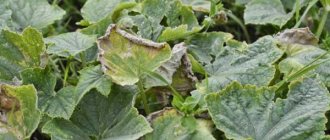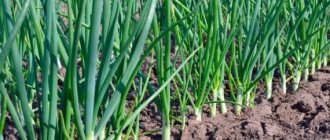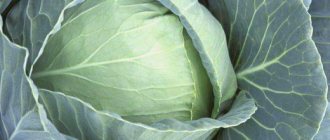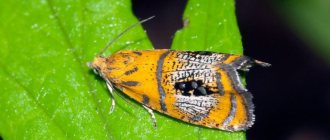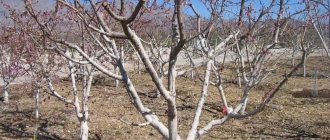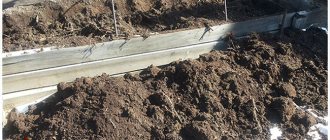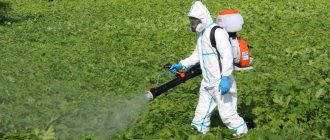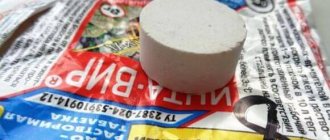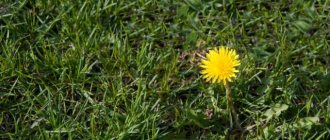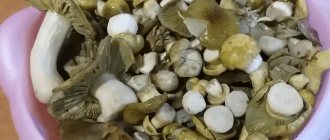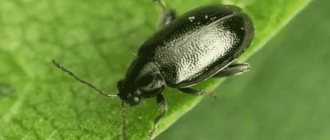Folk remedies for aphids are of great practical importance. First of all, because they are absolutely safe, and secondly, they work perfectly as preventive means of protecting plants from pests. As a rule, they are used in the later stages of the vegetative development of the plant, during the ripening of vegetables, berries, fruits, i.e. when the waiting period before harvest does not allow the use of chemical pesticides.
Aphids have many varieties, prefer to live on almost all cultivated plants - vegetables, berries, and fruits, and cause enormous damage. In a separate material on the website you can find information about what it looks like, where it lives, why it is dangerous, what are the features of its development and behavior .
Risk factors associated with aphid infestation of plants
This material contains a selection of the best and, most importantly, effective “folk” remedies for aphids.
How does ammonia affect pests?
We all know that ammonia has a distinct, specific odor that pests cannot tolerate. In addition to serving as an ideal deterrent, ammonium hydroxide can kill pests.
The substance shows high efficiency in the fight against not only aphids, but also other pests, for example, spider mites, caterpillars, etc. Regarding the plant itself, if this drug is used correctly, it will not cause any harm to crops, but it is important to adhere to the rules of use.
The mechanism of action of ammonium hydroxide on insects is as follows: thanks to active volatile substances, the drug penetrates the respiratory system, inhibiting it.
The substance also penetrates the body, causing burns and swelling of the mucous membranes, and affects the nervous system, which leads to convulsions and paralysis. The high efficiency and speed of action of the substances has made ammonia a very popular and sought-after remedy.
Precautions and safety precautions
When using ammonia against aphids, it is necessary to follow certain safety rules, the main ones of which are:
- To prevent ammonia from burning the nasal mucosa, use a mask or respirator;
- from contact with eyes and skin, use rubber gloves and closed-type clothing when processing.
Many people use folk remedies to combat aphids. One of the accessible and effective means for saving the crop is ammonia. This product does not harm plants, like other insecticides, but benefits the plants by acting as a fertilizer.
Rules of application
So, the main and basic rule of use is that it is forbidden to use it in its pure form, since in undiluted form the product will cause burns on plants. Before processing, a working solution should be prepared. Remember that the substance in its pure form is also dangerous for humans, as it can cause serious damage to the skin and mucous membranes.
It is not recommended to prepare the working solution in large quantities and in advance for carrying out several treatments. The fact is that volatile substances are most effective in a freshly prepared solution; over time they erode and the solution becomes ineffective.
Often, when processing, a watering can with a wide nozzle is used. This makes it possible to treat all the leaves of the bush, the lower shoots, which often have the largest concentration of aphids. The watering can can be replaced with a spray bottle, which will be as convenient as possible when treating plants at home.
Advantages of use
You can find a large number of varieties of aphids on your property or in your garden. This small winged insect is approximately 4 cm in length. They are very prolific and, if you do not fight them, the garden or vegetable garden will be completely infected after some time.
Ammonia is one of the effective folk remedies in the fight against aphids, since this insect is highly sensitive to ammonia evaporation. If this substance gets inside, it will lead to the inevitable death of the insect.
The main advantages of using ammonia are:
- the pungent odor of the product, which many types of aphids cannot tolerate;
- the substance is natural and safe;
- It has an effect on the parasite immediately upon first treatment.
Aphids cause a lot of inconvenience when they appear on the site or in the garden. Plants under its influence begin to develop various diseases and die. The number of pests is growing exponentially, and even ladybugs and birds are not able to regulate the number when a site is massively infested.
Minuses
Ammonia, used against aphids, has its drawbacks when spraying plants. The main ones are:
- a person may suffer from inhalation of ammonia vapor;
- an excess of nitrogen leads to yellowing and dying of leaves;
- the period of plant protection is short - while the smell of ammonia is present;
- During processing you need to wear a respirator and gloves.
Recipes with ammonia
There are several simple recipes with ammonia that will help you quickly and effectively fight aphids. Let's look at them in more detail.
Recipe 1
To prepare the working solution, you need to take 10 liters of water, then add 60 ml of ammonia and ¼ piece of laundry soap. The soap should be grated on a fine grater, which will allow it to dissolve in water faster.
After combining all the components, the solution is thoroughly stirred until the soap is completely dissolved. Next, pour it into a spray bottle or watering can and you can start spraying.
Recipe 2
In this case, the recipe remains the same, but instead of adding laundry soap, liquid soap is used.
Recipe 3
To prepare the working solution, take 0.5 liters of water, to which add 1 tbsp. ammonia and 25 ml of salicylic acid 2%. All components are thoroughly mixed and you can begin processing, during which it is important to moisturize the entire plant.
Recipe 4
You will need to take a bucket of water at room temperature, preferably pre-settled, add 40 ml of ammonia and 20 g of washing powder. After combining all components, the solution is thoroughly mixed until the powder is completely dissolved. 2 treatments are carried out with a break of 2 weeks.
Recipe 5
For this recipe you need to take 1 bucket of pre-settled water, add 50 ml of ammonia and 2 handfuls of wood ash. Mix thoroughly and can be used.
Features of the fight against aphids
Having chosen a certain method of control, one should not forget that a one-time treatment will not bring the desired effect. The fact is that a one-time spraying will not completely destroy all representatives; those that remain will quickly restore the population, and the work done will be reduced to zero.
After the initial treatment, a few days later, it should be repeated. If necessary, treat several more times, in which case the pests will be completely destroyed.
How to spray correctly?
Before spraying, the plant should be prepared. To do this, the bush is carefully inspected and heavily damaged parts are removed, which then need to be burned. This procedure minimizes the likelihood of re-infection, after which you can begin spraying.
Spraying
The effectiveness of the procedure largely depends on how thoroughly the plants are processed. As a rule, aphids accumulate on the lower shoots and on the underside of the leaves, so maximum attention should be paid to these points. To achieve maximum effect, after applying the solution, the plant is covered with film.
Spraying is carried out every 10-15 days until the aphids are completely eliminated. Remember that ammonia is also recommended for use as a prophylactic. In this case, make a weaker solution; add only 1 ml of ammonia to 1 liter of water.
Application against aphids
Before treating plants with ammonia against aphids, it is necessary to remove all branches from the garden and also get rid of anthills. To combat aphids with ammonia, you can use a watering can or brush to treat the leaves. The solution can also be used for prevention, and not just for infected plants.
Aphids usually hide under the leaves, that is, on the underside. These places should be given special attention. It is advisable to carry out the treatment on a cloudy but not rainy day or in the evening. Any plants, both infected and healthy, can be sprayed once every 14 days. But once a month is enough for prevention. If you need to protect large gardens from aphids, it is better to start treatment before the aphids already appear.
Important! Spraying with ammonia against aphids should be carried out in dry, cloudy weather. Best in the evening.
Common Mistakes
The effectiveness of the procedure directly depends on how correctly the ammonia is used.
Let's look at the most common mistakes that can reduce efficiency:
- As already mentioned, ammonia is a fairly aggressive substance that can harm the plant if the concentration of the solution is high. But you also need to take into account that insufficient concentration is extremely undesirable, since in this case the product will not have the desired effect. Therefore, it is very important to adhere to the recommendations regarding the dosages used.
- The effectiveness will decrease significantly if the solution is prepared in advance, since the active substances will erode. Should be prepared immediately before each procedure.
- Preventative measures are very important. If you managed to get rid of aphids on a plant, you should not abandon prevention, since the pest may return, because in most cases neighboring plants are also infected.
- It is recommended to spray not only those bushes on which the pest is noticeable, but also neighboring ones, even if they do not show signs of infection.
Why does ammonia help fight aphids?
In agriculture, ammonia is used as a fertilizer - it saturates the soil with nitrogen. Ammonia also helps in the fight against aphids due to its irritating effect: firstly, insects cannot stand its pungent smell, and secondly, if ingested, ammonia causes intoxication, paralysis and inevitable death of pests. Aphid repellents based on ammonia have a double effect: they get rid of aphids and act as a foliar nitrogen fertilizer for the leaves.
Unlike insecticides, ammonia can be used at any stage of development: during flowering, ovary, fruiting. It does not accumulate in the leaves, is quickly excreted and helps plants produce a good harvest. However, it is preferable to treat plants with ammonia in the first half of summer, when plants need nitrogen. In the second half of summer, nitrogen fertilizing is contraindicated, as it causes rapid growth, the plants do not have time to become lignified and may freeze in the winter. In addition, spraying in the first half of summer is much more timely, since aphids actively eat young leaves and shoots.
Additional tips and tricks
Spraying with an ammonia solution has its own characteristics, which include:
- It is better to carry out the procedure in the spring, after the covering material, which serves to protect the plant from frost, has been removed. Regarding indoor plants, it is better to carry out the procedure in mid-March.
- Spraying is carried out in calm weather so that the solution can completely fall on the bushes. Also, there should be no rain during spraying and for some time after, so that the substance is not simply washed away with water. It is better to spray in the evening or early in the morning, since aphids are less active at this time of day.
- Remember that while preparing the solution, as well as when spraying, be sure to use personal protective equipment, which includes a respirator, goggles, and gloves. Do not allow the solution to come into contact with exposed skin or mucous membranes; if contact occurs, rinse thoroughly with running water.
Make sure that no anthills appear on the site. These insects specifically plant aphids in areas because they consume the pest’s waste as food.
You can also fight ants with ammonia, but use a stronger solution; after applying it to the anthill, it is covered with a film, which allows toxic fumes to penetrate inside and not erode for some time.
Recipes for preparing alcohol-based aphids
Tender young foliage, herbs, and flowers are afraid of burns, while the trunk and branches of trees and shrubs can be treated at any time. Therefore, you will need several options for preparing a solution of different concentrations.
Different concentrations of alcohol are used to treat different plants.
Strong solution
Prepare as follows:
- warm water (25-30 degrees Celsius) - 1 l;
- vodka - 300 ml (it can be replaced with 150 ml of alcohol 96 degrees);
- laundry or green soap - 20 gr.
This concentration is used only for fruit bushes and trees. The trunk and branches are processed with a brush. The spray can be used in the fall or early spring before new leaves appear.
If solid laundry soap is used in the process of preparing the solution, then it must be crushed and first dissolved separately in a small amount of water, and then added to the total mass. The soap allows the solution to remain on the surface of the plant longer. It creates a protective film that makes it difficult for insects to feed and clogs the respiratory tract of pests.
Weak solution
To prepare this aphid remedy you will need:
- warm water (25-30 degrees Celsius) - 1 l;
- vodka - 100 ml (can be replaced with 50 ml of alcohol 96 degrees);
- laundry or green soap - 20 gr.
A lightweight version of the solution can be used to treat any crops.
Coca-Cola solution (weak)
The Coca-Cola drink must first be rid of carbon dioxide. To do this, you can pour it into a wide container or jar and leave it for a day so that the gas evaporates.
Mixing Ingredients:
- Coca-Cola - 1 l;
- vodka - 100 ml (or 50 ml of alcohol 96 degrees);
- laundry or green soap - 20 gr.
The acids contained in Coca-Cola in combination with alcohol have a detrimental effect on aphids. In addition, the sweetness of the drink helps the product stay on the surface of plants longer, which increases the period of its effect on parasites.
Oil solution (weak)
Refined sunflower oil is used to prepare this alcohol solution against aphids. You can’t take unrefined ones, as the strong smell can attract other pests, such as mole crickets.
The solution contains:
- warm water (25-30 degrees Celsius) - 1 l;
- refined sunflower oil - 300 ml;
- vodka - 100 ml (or 50 ml of alcohol 96 degrees);
- laundry or green soap - 20 gr.
The thinnest film formed due to vegetable oil disrupts the respiratory function of insects, and they die.
The spraying procedure with a warm solution should be carried out in the late evening, when the aphids stop actively moving. You need to process greens carefully, paying special attention to the underside of the leaf, where insects most often settle.
Ammonia as a fertilizer
As mentioned earlier, ammonia is used by gardeners not only as a means to get rid of aphids, but also as a fertilizer.
Due to the high nitrogen content, it provides a positive effect on leaves and inflorescences, and also stimulates plant growth. For this feeding, prepare the following solution: add 1 tsp per 1 liter of water. ammonia.
You can also dilute 25 ml of ammonia per 10 liters of water. As a rule, fertilizing is carried out at the beginning of the season.
How to use ammonia against black aphids?
Black aphid is a collective concept that includes individuals of blue and burgundy color. Most often it concentrates on tasty garden crops. Among them it is worth highlighting roses, viburnum, as well as tomatoes and cucumbers. It is worth noting that adult individuals are quite capable of biting through fairly dense and mature leaves, violating their integrity. Therefore, the affected leaves have holes, both on the top and bottom. On the inside you can find several black dots. If you look closely, this is an insect that crawls along the surface of the leaves. It is worth noting that young individuals prefer bright green leaves that form in the upper part.
There are several signs of blackcurrant infestation by aphids:
- Blackcurrant leaves curl at the top.
- There are burgundy pimples on the surface of currant leaves. This is a peculiar reaction of the plant to insect punctures. Other garden crops do not respond to aphid punctures.
- The surface of the affected leaves becomes covered with a sticky substance. It's kind of like sugar syrup.
How to use ammonia against black aphids:
- Dilute 100 ml of product in 10 liters of water
- Add 100 ml of unscented liquid soap
- Spray the bushes
Spraying
Methods of using alcohol solution
A strong ethanol solution is used for large plants - shrubs and trees over 2 years old. Also, in case of severe aphid infestation, it is used for young fruit crops that have already bloomed and have an ovary. Weak solutions can be applied to all plants and herbs, berries and flowers. It can also be used to treat any fruit during the flowering period.
Fruit bushes and trees
Aphids often appear on fruit trees and berry bushes immediately during the flowering period. In such cases, it is better to use a weak solution with water or Coca-Cola for spraying. If the ovary has already formed and the foliage has become stronger, you can use a strong solution.
A solution of moonshine with soap will help get rid of aphids on trees
It is recommended to remove and burn severely damaged branches and ovaries, as they can cause infection of the plant. It is recommended to dip and rinse the affected branches in the solution, if possible. The rest of the tree or shrub is thoroughly sprayed.
To prevent subsequent aphid infestation, you need to protect the area from ants. They help the spread and reproduction of this parasite.
One way to safely disrupt ant trails is to use ant traps or fly tape. First, the barrel is wrapped with waste cloth, and on top with adhesive tape.
Berry bushes and vegetable crops
Tomatoes respond very well to spraying with an alcohol solution. This procedure speeds up the process of fruit ripening, and when processing seedlings, it helps protect tomatoes from blackleg disease.
Aphids on tomatoes can be easily destroyed with a light alcohol solution and soap.
After the ovary appears, cucumbers, tomatoes, eggplants, peppers and other vegetable crops can be treated against aphids with a strong alcohol solution. A weak concentration is used for berry bushes: strawberries, wild strawberries, blueberries, honeysuckle. A solution with oil is not suitable for such plants.
Flower garden crops
Often roses and chrysanthemums on the street are attacked by aphids, which not only destroy the flowers, but also spread to garden crops. A strong alcohol solution is not suitable for flower crops. For them, it is better to use a weakly concentrated product, and to increase the duration of its action, a recipe with refined oil is suitable.
You can protect roses from aphids by periodically treating them with alcohol and sunflower oil.
If possible, the tops and stems should be dipped in the solution and washed, and the rest should be sprayed on all sides. The affected vines are untied from the supports and carefully placed in a basin or trough, then carefully poured with the prepared product. The plants are left in this form for 5-10 minutes and then attached back.
Not all varieties of roses and not all flowers tolerate treatment with ethyl alcohol. In order not to harm the plant, it is better to spray one shoot or bush with a solution with a very low concentration (50-60% of a weak solution), and evaluate the result after a day. If no burns appear, and the stems and leaves look healthy, then you can begin extensive processing of the flower garden.
If the solution turns out to be too strong, then the concentration must be halved. All ingredients except alcohol remain in the same proportions.
Other means for protecting roses from aphids are discussed in our article.
Home flowers
To spray home flowers against aphids, the lowest concentration is used:
- warm water (25-30 degrees Celsius) - 1 l;
- vodka - 50 ml (or 25 ml of alcohol 96 degrees);
- laundry or green soap - 20 gr.
A solution of vodka and soap will help get rid of aphids on home flowers.
Ficus plants are very fond of this treatment. If the plant has large leaves, then it is better to wipe it rather than spray it. Saintpaulias and gloxinias, on the contrary, do not tolerate such treatment. It is better to refrain from it and choose another method of combating aphids.
Plants not listed in this article should be tested first to see if they react to ethanol. Conduct a test treatment of part of the shoot or bush using a minimum concentration of ethyl alcohol.
